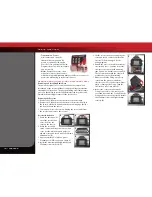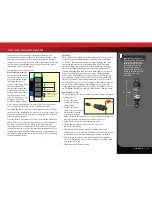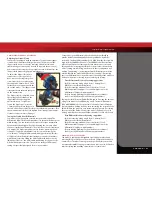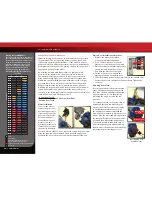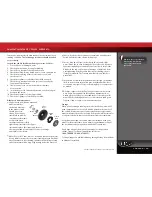
16 • TRAXXAS
DRIVING YOUR MODEL
Now it’s time to have some fun! This section contains instructions on
driving and making adjustments to your model. Before you go on,
here are some important precautions to keep in mind.
Allow the model to cool for a few minutes between runs. This is
particularly important when using high capacity battery packs that
allow extended periods of running. Monitoring temperatures will
extend the lives of the battery and motor.
Do not continue to operate the model with low batteries or you
could lose control of it. Indications of low battery power include
slow operation and sluggish servos (slow to return to center). Stop
immediately at the first sign of weak batteries. When the batteries
in the transmitter become weak, the red power light will begin to
flash. Stop immediately and install new batteries.
Do not drive the model at night, on public streets, or in large
crowds of people.
If the model becomes stuck against an object, do not continue to
run the motor. Remove the obstruction before continuing. Do not
push or pull objects with the model.
Because the model is controlled by radio, it is subject to radio
interference from many sources beyond your control. Since radio
interference can cause momentary losses of control, allow a safety
margin of space in all directions around the model in order to
prevent collisions.
Use good, common sense whenever you are driving your model.
Intentionally driving in an abusive and rough manner will only
result in poor performance and broken parts. Take care of your
model so that you can enjoy it for a long time to come.
High performance vehicles produce small vibrations which may
loosen hardware over time. Frequently check wheel nuts and
other screws on your vehicle to ensure that all hardware remains
properly tightened.
About Run Time
A large factor affecting run time is the type and condition of
your batteries. The milliamp hour (mAh) rating of the batteries
determines how large their “fuel tank” is. A 2000 mAh battery pack
will theoretically run twice as long as a 1000 mAh pack. Because of
the wide variation in the types of batteries that are available and
the methods with which they can be charged, it’s impossible to give
exact run times for the model. Another major factor which affects
run time is how the model is driven. Run times may decrease when
the model is driven repetitively from a stop to top-speed and with
repetitive hard acceleration.
Tips for Increasing Run Time
Use batteries with the highest mAh rating you can purchase.
Use the included charger or a high-quality peak-detecting charger.
Read and follow all maintenance and care instructions provided by
the manufacturer of your batteries and charger.
Keep the ESC cool. Get plenty of airflow across the ESC heat sinks.
Lower your gear ratio. Installing smaller pinion gears will lower
your gear ratio and cause less power draw from the motor and
batteries, and reduce overall operating temperatures.
Maintain your model. Do not allow dirt or damaged parts to cause
binding in the drivetrain. Keep the motor clean.
mAh Ratings and Power Output
The mAh rating of the battery can effect your top speed
performance. The higher capacity battery packs experience less
voltage drop under heavy load than low mAh rated packs. The
higher voltage potential allows increased speed until the battery
begins to become discharged
RUNNING IN WET CONDITIONS
Your model is designed with water-resistant features to protect the
electronics in the model (receiver, servos, electronic speed control).
This gives you the freedom to have fun driving your model in wet
conditions. Though highly water resistant, the model should not
be treated as though it is submersible or totally, 100% waterproof.
Water resistance applies only to the installed electronic components.
Running in wet conditions requires additional care and maintenance
for the mechanical and electrical components to prevent corrosion
of metal parts and maintain their proper function.
Precautions
Without proper care, some parts of your model can be seriously
damaged due to contact with water. Know that additional
maintenance procedures will be required after running in wet
conditions in order to maintain the performance of your model.
Do not run your model in wet conditions if you are not willing to
accept the additional care and maintenance responsibilities.
10

















